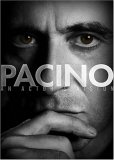| Reviews & Columns |
|
Reviews DVD TV on DVD Blu-ray 4K UHD International DVDs In Theaters Reviews by Studio Video Games Features Collector Series DVDs Easter Egg Database Interviews DVD Talk Radio Feature Articles Columns Anime Talk DVD Savant Horror DVDs The M.O.D. Squad Art House HD Talk Silent DVD
|
DVD Talk Forum |
|
|
| Resources |
|
DVD Price Search Customer Service #'s RCE Info Links |
|
Columns
|
|
|
Pacino: An Actor's Vision
THE MOVIES:
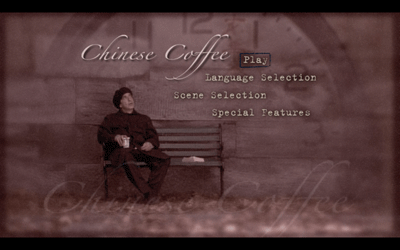
It's a cliché that all actors want to direct. When it's announced that a famous performer is going to lens his own movie, popular culture tends to snicker, anticipating a vanity project where some nebbish actor portrays himself as an Adonis or a beauty queen gives herself an opportunity for histrionics and emotionally heavy monologues. Which in some cases might be true, but that doesn't mean that, as a concept, we should dismiss this notion outright. There's no reason why a good actor can't also be a good director. It's not like he's trying to make a rock album. Also, it's not like the derision cuts both ways. I've been seeing Peter Bogdanovich in front of the camera far more often than I'd care to lately, and Entourage fast-talking, cynical agent Ari Gold (as played by Jeremy Piven) would have earned a pardon on all his past sins for making fun of M. Night Shymalan for always writing himself into his pictures if Shymalan wasn't an active participant in the joke.
Tim Robbins, Sean Penn, Robert DeNiro, and many others have made quite decent films as directors, some that they starred in and others they didn't. These are intelligent performers. They're artists. So, why not give them the freedom to move within their art?
The new (and oft-delayed) boxed set, Pacino: An Actor's Vision, has been put together specifically to examine the small amount of detours one of our best actors has taken into making movies on his own. If you consider the directors Pacino has worked with over the years--Francis Ford Coppola, Michael Mann, Warren Beatty, and Sidney Lumet, to name a few--and if you imagine that the set of each movie has been a kind of classroom, then you realize that he's had an opportunity to take lessons from some of the best. Granted, that doesn't make it a foregone conclusion that he'll be able to apply what he's picked up and make a decent movie, but I'm all for letting him try.
Interestingly enough, Pacino: An Actor's Vision has its own unique wrinkle. The three main movies packaged here (there is a fourth that is more of a bonus promo film) are all either adaptations of stage plays that Pacino performed in the legitimate theatre (Chinese Coffee and The Local Stigmatic) or in the case of Looking for Richard, a documentary of the actor's attempt to bring a production to life. All have their origins at the Actor's Studio, where Pacino has been a member since his early career, and so it's really a case of the actor taking the reins in order to try to bring all of these facets of his art together, to couple his stagework with his film work and somehow imbue each with some of the grandiosity of the other.
Together, these features give us a completely new glimpse into what makes the legendary performer tick, and at the same time, they are actually really enjoyable to watch. Education can't dominate entertainment.
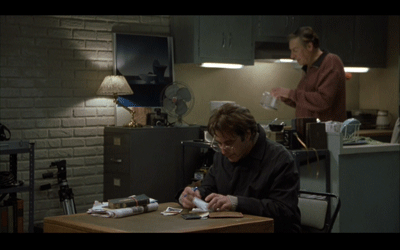
* Chinese Coffee (99 min., 2000): The play version of Chinese Coffee began as an exercise at the Actor's Studio, where Pacino saw writer Ira Lewis performing it with another actor. Intrigued by the concept--two middle-aged bohemian failures in a verbal tussle that runs into the wee hours of a single night in a Greenwich Village apartment circa 1982--Pacino decided to get involved and take over the part of Harry Levine, the semi-autobiographical role the writer had been doing himself. Over the next several years, the actor worked with the author to refine it, eventually taking it out to the public and then making a movie out of it.
The two men in the picture are actually both artists. Harry is the author of two unsuccessful novels, whereas Jake (the late Jerry Orbach) is the author of an unsuccessful life. He wanted to be a writer, but he's hid behind a decades-long "creative block," instead making his living as a photographer taking pictures of people in nightclubs. Jake's main profession isn't taking snapshots, though, it's having opinions--about everyone and everything, but especially about books. It's funny, because midway through the picture, Jake makes fun of the kind of guy that hangs out in Greenwich serving up criticism while really having nothing of his own to criticize. It's one of many, many contradictions that these two men fail to see in each other as they tear themselves apart to see who can come as out having the most dashed dreams.
The main thing Pacino does with the movie version of Chinese Coffee is the main thing most people do when they bring such a text-based stage play to the screen: he breaks it out of the four walls of Jake's tiny apartment. The benefit of film is that they aren't confined to a stage, and so backstory that is likely only talked about in the original script can now be shown. In addition to the men's floundering friendship, we also get to see their failures in love. Lewis is making a definite correlation between how the men approach their romance and their art. In all aspects of life, it's how you set out to accomplish the things that are important to you that matters, and a half-hearted romance will infect a half-hearted novel and everything else will come tumbling after.
Some of the verbal assaults in Chinese Coffee are brutal. Lewis structures the escalating conversation like a dual confession. The central object of contention is Harry's latest manuscript, and the more the argument returns to his prose, the more that comes out about what's really going on. Pacino and Orbach make a great pair, a sort of Mutt and Jeff. Where Pacino is gruff and chiseled, Orbach is more gregarious, lower toned, with rounded edges like a reliable hound dog. Their physical presence and the timbre of their voices are a ruse, however, allowing the actors to pull a bait and switch as the text reveals that the interior of the two men are very nearly the opposite of the exterior.
As a director, Pacino is definitely competent. His choices are limited as long as the action remains in one room, but it's to his credit that Chinese Coffee never feels unnaturally stifled. Pacino and editor Michael Berenbaum (Before Night Falls) work with the words to keep the eye moving back and forth between the competitors. Another positive is that Pacino resists showing off when he goes to the flashbacks. Often the tendency for actors transitioning to directors and novices in general (I'm looking at you, Zach Braff) is to overcompensate and try to be tricky with the visuals so the audience notices that they are actually using the tools of the trade, but Pacino is confident and assured enough that he doesn't worry about that. Some of the framing is awkward at times, such as a couple of quick cuts to reaction shots in the first reel, and the use of slow-mo in a few scenes seems unnecessary, but Pacino's main asset is knowing to stay out of the way. The play's the thing, and no adornment required.
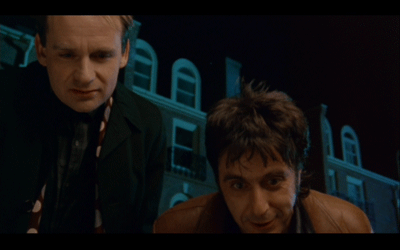
* The Local Stigmatic (56 min., 1990): This film is nearly mythological, a sort of Holy Grail for Pacino fans. I remember first hearing about it on an episode of A&E's Biography and becoming fascinated with the idea of it. A one-act play by Heathcote Williams, Pacino first starred in the stage version in 1969, and he actually began working on the movie in 1984. Even when photography was completed, he continued to re-edit it, never releasing it fully. There have been very few, carefully controlled screenings. Given that this set was delayed multiple times since it was announced last year, some wondered if Stigmatic would ever be readily available.
There isn't a lot of plot to The Local Stigmatic, at least not in a conventional sense. Pacino plays Graham, a verbally aggressive British lout. He is prone to long rants about the things that irk him, and they tend to involve poking at entities that somehow are not what they pretend to be, whether it's a racing dog that refuses to run, a tipster who thinks he has all the info, or a big-shot celebrity. His friend Ray (Paul Guifoyle, CSI) passively listens, sometimes commenting on illogic in the story, but never quite betraying what he thinks. The movie follows these two as they move aimlessly through their afternoon and on into the night, searching for a target for their twitchy energy. You get the sense they'd maybe turn on each other if they didn't find an outside victim. Their banter is darkly humorous, but there is always the threat of violence in the air, and sometimes, the tension is almost sexual. Pacino and his co-director David F. Wheeler use cross-cut fades to move back and forth between the two at crucial moments, and the effect is of blurring this pair together, two halves of one whole.
Eventually they encounter a film actor, David (Joseph Maher, Heaven Can Wait), that Graham recognizes. Graham actually follows the gossip papers about celebrities, apparently to spite himself. "Fame is the first sin," he says, "because God knows who you are." This is as close as Williams gets to a thesis. The ego seduction of David and his eventual violent comeuppance is a way of taking him out of commission. Ray does all of the actual physical damage, while Graham unravels a kind of gutter poetry, a soliloquy of contempt. Pacino and Guifoyle are both menacing in their way, almost feral. It could even be an additional commentary on the banality of David's character that he is so caught up in his fame and self-image, he is blind to their real intent. If the author was this dismissive of celebrities back in the 1960s, one wonders what kind of script we'd get out of him if we could transport him through time to the present day.
The Local Stigmatic is more visually active than Chinese Coffee. It's full of movement and changes locations several times. It's also a little bit of a puzzler, as the actual narrative line is very tenuous. The dialogue reminds me at times of David Milch's writing on Deadwood, in that the initial hearing of it merely registers the words, and it takes added effort to divine the meaning. As a piece of cinema, The Local Stigmatic is not something you're going to understand entirely the first time, but it will leave an impression on you.
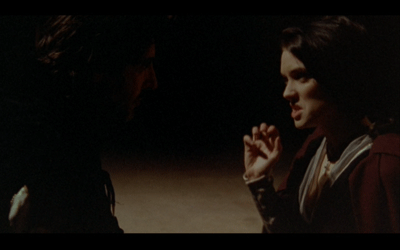
* Looking for Richard (112 min., 1996): This film is Pacino's most perfect synthesis of cinema and theatre. A meta-documentary shot over four years, its main goal is to make Shakespeare accessible to the general public by cracking open the creative process and wrestling with all of the problems that many people might have with their preconceptions of the material. As it turns out, it's a problem actors often have when approaching how to perform in a Shakespeare play, and Pacino digs at an anxiety endemic to American actors when it comes to tackling the Bard.
Pacino builds his film around a catch-as-catch-can production of Richard III. He assembles a cast that includes Alec Baldwin, Kevin Spacey, Winona Ryder, Paul Guifoyle, Aidan Quinn, and others, and he cuts together footage of rehearsals, actual performances, location scouting, and discussions amongst cast and crew about the meaning of the play. By mixing up different aspects of the process, splicing table readings with full-dress performances and plain-clothes recitations, he shows the way interpretations can change and understandings can be found. He also goes to the street and tries to suss out what people think of when they hear the name Shakespeare, and he gets scholars to shed some light on the historic background that informs the text.
Over the course of Looking for Richard, we get a very abbreviated version of Richard III. We don't see every scene, but the story is essentially complete. I probably understand the relationships and motivations much better having watched this documentary, too, than I did watching the full productions by Olivier and McKellan. By showing the backstage drama, and often dispensing with their own po-faced demeanor with shots of self-deprecating humor, Pacino and Company enliven the play, freeing the power of the writing from the overly serious reputation it has taken on over the years. The actor also reveals what a strange and often accidental process creation can be, and it's as invigorating to watch as it must have been to craft.
Keep an eye out for the shots of the bearded Englishman who berates Pacino about his Shakespearian pretensions. I believe that is Heathcote Williams, author of The Local Stigmatic (though I'm not 100% on that). (It also turns out Williams was in Basic Instinct 2, but we'll try not to hold that against him.)
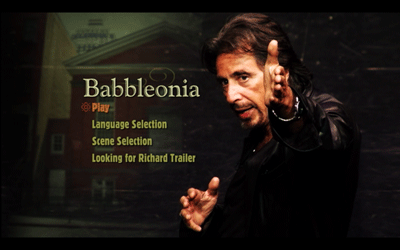
* Babbleonia (2005): This new 56-minute documentary is essentially the lid on the whole Pacino: An Actor's Vision exercise. An extended conversation with respected NYU film professor Richard Brown (host of AMC's excellent Movies 101) it's a tribute to the Actor's Studio (where the conversation takes place), but even moreso a tribute to Al Pacino's philosophy and artistic drive. He tells many stories about his years in the theatre, revealing how each play, and each individual performance of each play, has informed the actor he has become. The two men delve deep into the particulars of putting together a production, and some of the differences between working on the stage and for the camera.
While in a lot of ways Babbleonia is your quintessential DVD extra and could have just been a bonus on the Look for Richard disc, by separating it to be its own thing (and making it exclusive to An Actor's Vision), it drives home that this whole collection is about Al, about his instincts and his compulsions. While it could have been easy to get hung up on one film, this connecting wire of the session with Brown emphasizes the sum and not the parts.
If all you know about Al Pacino is the bluster and the hoo-ah, you owe it to yourself to sit down with these four DVDs. He is so much more than that. He's a considered, thoughtful man, and a passionate artist, and I hope this is just the beginning of our voyeurism, that we will see much more of this particular actor's vision in years to come. He's certainly got enough experience to share and fill multiple boxed sets.
THE DVD
Video:
All three of the main features are shown in a nice 1.85:1 anamorphic widescreen transfer. The colors are well rendered, the image resolution strong. Local Stigmatic is slightly less crisp than the others, revealing some fuzzy edges here and there.
Babbleonia is shown in full frame.
Sound:
All three films get a nicely rendered 5.1 surround mix, and Chinese Coffee and Local Stigmatic also have 2.0 stereo options. These discs have Closed Captioning in addition to regular English and Spanish subtitles.
Babbleonia only has a stereo mix, captioning, and English subtitles.
Extras:
Pacino: An Actor's Vision was put together with the intention of giving the viewer tools to make a deeper examination of what is going on within these movies and with the artist making them. All of the movies have an informational frame to them, with particular attention paid to both Chinese Coffee and The Local Stigmatic. In Pacino's sitdown with Richard Brown, they discussed all three of the feature films in the box, about the process of adapting and shooting these plays and the particulars of each production. The elements used here are from the same sessions as Babbleonia. Pacino talks candidly about the special challenges he encountered by being in the piece while also orchestrating the production. He even says he doesn't feel he has any great talent for directing, nor any great passion for it, but when you hear him discuss the thematic material with such vigor, you kind of wish he'd get over that. At the same time, when you hear him explain the long history he has had with Stigmatic, the changing perceptions, and what he hoped to achieve by finally filming it (and finally releasing it), it reveals what a conscientious artist he is. The "Introduction" and "Epilogue" play as part of the full program on all discs, with the intros being just a couple of minutes long and the epilogues running for about twenty. Jerry Orbach also talks to Brown on Coffee, co-director David F. Wheeler sits down for Stigmatic, and Alec Baldwin joins Brown for Richard.
The DVDs for Chinese Coffee and The Local Stigmatic are graced with audio commentaries by Pacino. After listening to him talk on the video extras, I was stoked to listen to these tracks--and I can't recall the last time I was stoked for a commentary. (It makes sense that Looking for Richard gets no extra explanation, as it provides commentary unto itself.) The tracks don't disappoint. They are less about specific details, but more about impressions, the remainder of memory, and Pacino's continuously changing interpretation of his own work. As an icon, Pacino comes across as refreshingly absent of ego, and he's extremely generous to his collaborators. He loves and adores all of them, and particular tribute is paid to Orbach and Maher, both of whom are no longer with us.
Each DVD has a trailer for Looking for Richard, including Babbleonia, where the back cover bills it as a "sneak peak" at the movie. No, it's just the trailer. Babbleonia also has an Easter egg of Al getting lost on a tangent. To access it, highlight the Looking for Richard trailer, but instead of pressing "ok," hit your right arrow button. The image of a hand will appear in the lower right, and if you select it, the extra scene will load up.
All four DVDs come in individual cases, and as a set, they are kept in a nicely printed cardboard box.
If you'd like to go further with you Pacino love, an insert inside the box advertises a companion book, simply titled Al Pacino.
FINAL THOUGHTS:
Highly Recommended. I can't think of another product analogous to Pacino: An Actor's Vision. Housing three films directed by the legendary actor, along with supplemental material and a bonus documentary, this box is, on one hand, a textbook, but through and through, it's entertainment of the highest order. All of the movies have their origins in stage plays, but the true vigor of the project is the excitement of its star. Pacino loves both of his chosen mediums, and he's using each to inform the other, and ultimately show his audience how both aspects of his craft--stage acting and screen acting--stand apart but also intersect. Which isn't to say that it's all about the lesson. You can ignore the special features and enjoy the movies for the sheer pleasure of them being good movies. The fact that he builds this object lesson using three very good films--The Local Stigmatic, Looking for Richard, and Chinese Coffee--is just the icing on the cake. He turns homework to candy, and makes us realize what sweet information there is to be had.
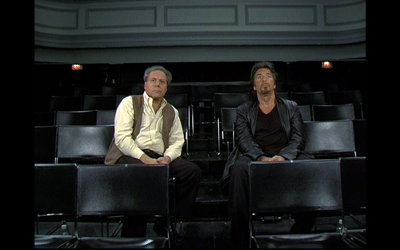
Jamie S. Rich is a novelist and comic book writer. He is best known for his collaborations with Joelle Jones, including the hardboiled crime comic book You Have Killed Me, the challenging romance 12 Reasons Why I Love Her, and the 2007 prose novel Have You Seen the Horizon Lately?, for which Jones did the cover. All three were published by Oni Press. His most recent projects include the futuristic romance A Boy and a Girl with Natalie Nourigat; Archer Coe and the Thousand Natural Shocks, a loopy crime tale drawn by Dan Christensen; and the horror miniseries Madame Frankenstein, a collaboration with Megan Levens. Follow Rich's blog at Confessions123.com.
|
| Popular Reviews |
| Sponsored Links |
|
|
| Sponsored Links |
|
|
| Release List | Reviews | Shop | Newsletter | Forum | DVD Giveaways | Blu-Ray | Advertise |
|
Copyright 2024 DVDTalk.com All Rights Reserved. Legal Info, Privacy Policy, Terms of Use,
Manage Preferences,
Your Privacy Choices | |||||||









